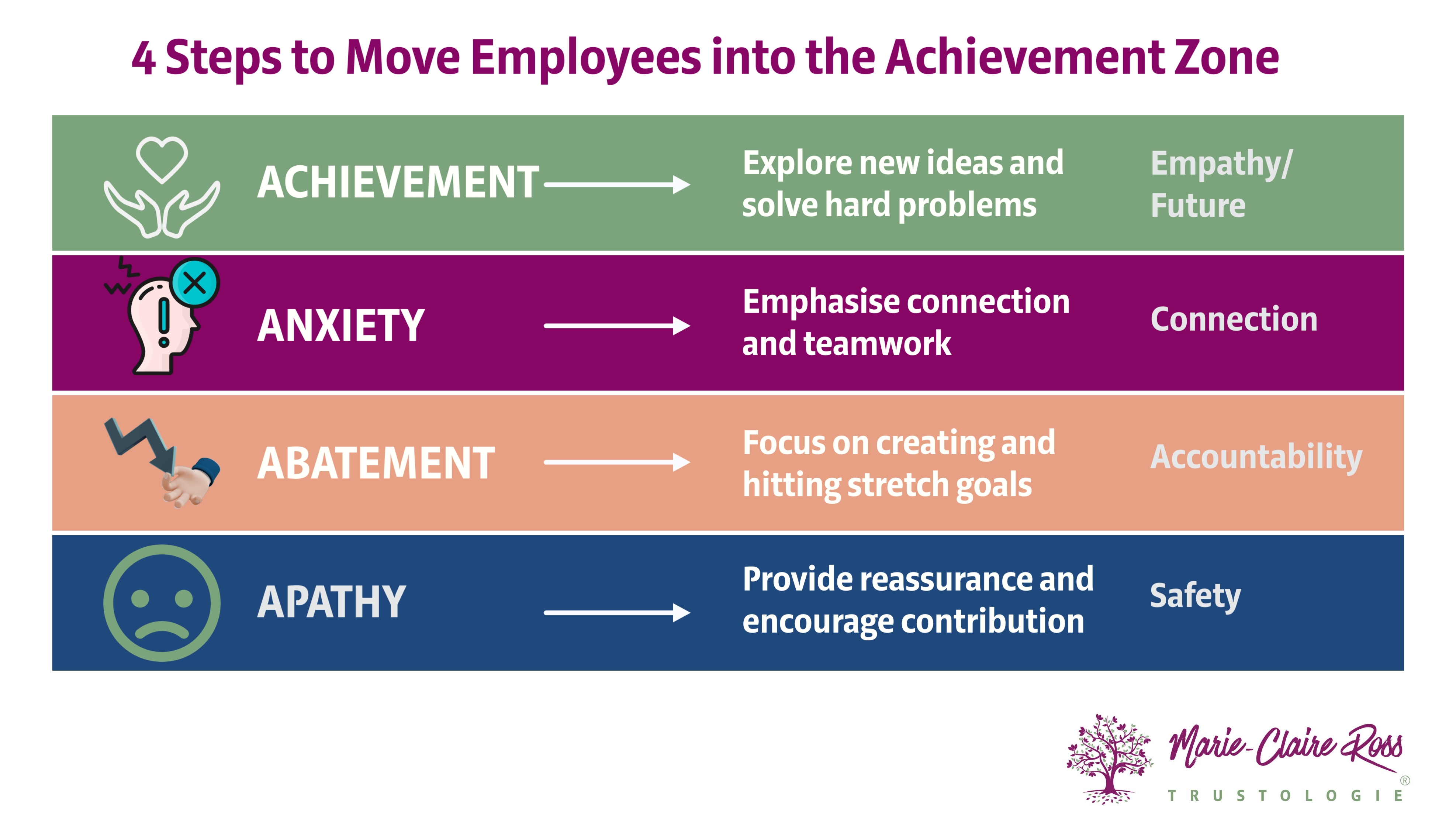11 min read
4 Practical Strategies for Better Emotional Management in the Workplace
I have a friend who often finds herself at the mercy of her emotions. Recently, she called me to rehash a confrontation she’d had with a group of...
Develop leaders, strengthen executive teams and gain deep insights with assessments designed to accelerate trust and performance.

Transform how your leaders think and perform with keynotes that spark connection, trust and high-performance cultures.

Explore practical tools, thought-leadership and resources to help you build trusted, high-performing teams.

Trustologie® is a leadership development consultancy founded by Marie-Claire Ross, specialising in helping executives and managers build high-trust, high-performing teams.

4 min read
Marie-Claire Ross : Updated on May 18, 2022

If you do a search on LInkedIn for Trusted Leader, you'll find around 1 million people have the audacity to label themselves "Trusted Advisor," "Trusted Leader" or even "Trusted and Inclusive Leader."
I say audacity because telling people you are trustworthy (particularly early in a relationship) is actually a red flag that you're not.
As I mention in my book, Trusted to Thrive: How Leaders Create Connected and Accountable teams:
You can't talk your way into trust, you have to behave your way into it.
One of the fundamentals with trust building is understanding that trust is processed in the limbic brain. The part of the brain that doesn't understand language, only feelings. As human beings, we trust people based on how they make us feel, not so much on what they say.
That's why for many people trusting their leaders is all about seeing if they match their words to their actions or "walk the talk". We need to see evidence over time that people are going to do what they say before we can trust them.
Sounds great in principle, but being in alignment with who we really are can be hard to do. It gets even harder, if we aren't very self-aware or we don't practise what we preach.
Over the years, I’ve worked with hundreds of leaders and what I’ve found is that leaders who rate themselves highly for trust are typically not rated that highly by their peers and direct reports (the only valid method to assess how trusted you are at work – not your own personal opinion).
As someone who has deeply studied trust over the last eight years, I would never tell people that I am trustworthy. Before I get misunderstood, let me go through my reasons:
1. Being trustworthy is actually a very broad concept
Trust is situational, dynamic, emotional and multi-directional. It's also pretty subjective.
Saying that you are trusted leader includes being trustworthy in lots of different contexts. For example: you might be trustworthy with treating customers with care and listening to their needs, but you might always be late to internal meetings. Your boss would see you as trustworthy in terms of looking after clients, but not trustworthy when it comes to being on time and getting to important meetings.
No-one is ever trustworthy 100% of the time. And I mean no-one.
How can you be? If you are tired, sick, overworked or say 'yes' to everyone, you won't be able to make or your deadlines or fulfil your promises. Not only that, sometimes we are unaware of where we are breaking trust with people.
2. Not everyone will trust you
Each person around you varies in their propensity to trust based on their tolerance to risk, personality characteristics, life experiences and level of power.
Saying you are a trusted leader infers that everyone will trust you. That's incorrect. Not everyone will. Just ask any CEO of a large organisation in charge of 1,000 people. They know that not everyone will trust them all the time.
This doesn't mean that you're not trustworthy. Who does or does not trust us can often say a lot more about them than us. After all, we often distrust people who reflect a part of ourselves that we are not comfortable with owning.
3. Faking it to you make it
A lot of unaware people will make claims about themselves that simply aren't true.
In their mind, because they say they are trustworthy they must be. For example, they would never steal money from people, so therefore they must be trustworthy. Or they are a good person or [INSERT OTHER REASON that proves their integrity].
Our brains can be very good at justifying why we are trustworthy, while ignoring all the little things that we do that betray that.
Not only that, a lot of untrustworthy people will say that they are trustworthy. Ask an online scammer or a fraudster and they will always tell you they are trustworthy.
In my whole life, I've only met one person who told me not to trust them. As human beings, it's pretty rare for us to warn people that they can't trust us.
One of the reasons some people say they are a trusted leader is that they want other people to believe it (while convincing themselves). Think about it, if it really were true, do you need to say it?
It's like stunningly gorgeous people don't have to tell everyone they are beautiful. It's pretty evident. Nor do geniuses need to tell people they are smart (BTW, have you noticed that some not so smart people are always trying to convince people they are smart? Big flag for low to average IQ or delusions of grandeur.
So you're probably wondering, how do you convey to people you are trusted leader?
1. Spend time learning about how to build trust in the workplace
Trust is a big, complex topic. Learn about what it is and how it works. Don't assume you know all about it. Do the work. Start by reading books - The Thin Book of Trust by Charles Feltman is a good start, as is my book Trusted to Thrive.
2. Reflect daily on your behaviours
One of the things with trusted leaders is that they are self-aware. If we don't consciously work on being more trustworthy with people, it means that we unintentionally do behaviours that may seem trustworthy. Trusted leaders spend time daily or at least weekly reviewing how they have behaved and treated people. They just don't think about what they do, but how they do it. Carefully working out what they need to do better and what they have done well. They don't assume that being a leader, or even a trusted leader, is innate. They work on it.
3. Take action - Remember that people are more likely to trust leaders who do what they say they are going to do. People want a leader they can rely on - who will be there to back them up and support them when they need it. This means doing trustworthy leadership behaviours - admitting mistakes, asking questions, showing interest in others, listening, taking action on what people want and not jumping to a negative assumption.
In my opinion, saying you are a trusted leader screams both a lack of self-awareness and knowledge of what being a trusted leader is really about. It often highlights a blindspot between your perception and other people's reality. The only ones that can say you are a trusted leader are your direct reports. After all, they are the ones that are impacted by your behaviours.
Bottom line is saying your a trusted leader is a flag that you probably aren't. It actually makes people more likely to observe your behaviours to see if they can indeed, trust you. Of course, if they decide you aren't trustworthy it makes you look inauthentic and a tad arrogant.
And unless you are really self-aware, have received coaching to improve your behaviours have studied how to be a trusted leader, and rated consistently high for trust on your 360 degree interview I'd advise not using that term at all costs.

11 min read
I have a friend who often finds herself at the mercy of her emotions. Recently, she called me to rehash a confrontation she’d had with a group of...

9 min read
True leadership presence isn’t a performance or a set of charisma hacks; it is the felt experience of who you are being in the room. By cultivating...

13 min read
As teams return from their summer (or winter) break, you may notice subtle shifts in your team’s energy. Even if the end of year was positive, a new...
.png)
Our brains are naturally wired to seek out certainty and a sense of safety.

A few months ago, I caught up with a CEO from a midsize firm for lunch. He was keen to tell me that people only care about money. His business that...

Another high-pressure management meeting has just closed with no clear actions. Targets missed. Heightened tension about employee bonuses still not...